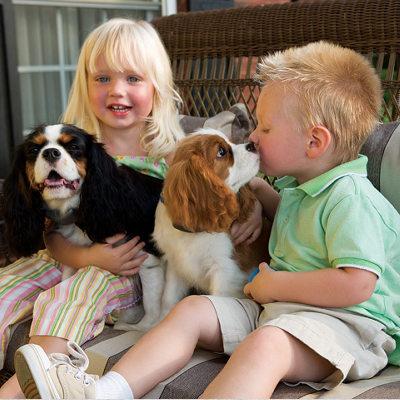By Toni Gibson, Training and Behavior Education Specialist
There’s nothing that can beat the blues quite like a puppy. Just look at this face:  What is it about puppies that make us feel better instantly?
What is it about puppies that make us feel better instantly?
But there is actually a lot more to puppies than little paws, scrunched faces, and puppy breath. Socializing a puppy is one of the best things for a puppy and can set them up for success for the rest of their lives. Puppies learn about their reality right after they’re born. Here we’ll go over the different developmental stages of a puppy and things you can do to successfully socialize your puppy at this stage
Neonatal stage: Birth to 2 weeks- Puppies will sleep and eat most of the time. They navigate the word by their touch and smell senses. Touching and holding the puppies in this stage for 1-3 minutes can be helpful for their development and get them used to human touch.
 Neonatal puppies spend the majority of their days sleeping. Growing is hard work!
Neonatal puppies spend the majority of their days sleeping. Growing is hard work!
Transitional period:
Weeks 2-4- Eyes and ears begin to open, so they’ll start to see what you and their littermates look and sound like. They begin to walk here too.
At this point, you can pick them up, talk to them, and spend time with each one individually. Begin to introduce them to novel stimuli, like different floor textures (yes, even the dreaded linoleum that so many dogs fear later in life!)
Socialization period:
Weeks 4-12- Puppies will really begin to learn here! It is very important to keep puppies with their littermates and Momma so they can learn to relate with other dogs. They will begin to learn bite inhibition with their littermates—when one bites too hard, the other squeals to say “Ouch!” Also, in the first 3 months of their lives, they should be introduced to as many things as possible to reduce the chance that they’ll be afraid of them later in life. Introduce them to rain, mailmen, crates, toys, children, the sound of trucks, busy sidewalks, wheelchairs, umbrellas, and much more!
 Socialization is very important for puppies.
Socialization is very important for puppies.
Juvenile period:
up to 6 months- Your puppy is going to get very enthusiastic! It’s important to provide lots of appropriate chew toys and begin using positive training methods. Continue introducing them to new experiences and stimuli that result in positive fun consequences, such as receiving treats or praise.
Adolescent period:
6 months to 1 year- The puppy will be getting used to the world and hopefully better established in a routine. At this point, continue introducing them to new things and using positive training methods. If puppies aren’t introduced to things when they are young, there is a chance they can become fearful of them later. For example, if puppies were never introduced to men wearing hats, they might become fearful of them later in life. This goes the same way for vacuum cleaners. If puppies were not socialized to a vacuum cleaner, it might become a source of fear for them.
 This puppy says, "How should we socialize me today?"
This puppy says, "How should we socialize me today?"
All of this means we have some control over what our dogs are afraid of by how much we socialize them. As puppies grow, they should be positively introduced and socialized to as many things as possible.
Additionally, when we introduce all age dogs to new things, it’s important to make sure that the dog has a positive experience with that new thing. Provide your dog with treats or praise when introducing new things, such as umbrellas, vacuums, and new people.
You should also consider introducing things slowly so that the experience isn’t overwhelming. For example, when introducing a dog to the vacuum, introduce them to the vacuum itself and make that a positive experience before turning it on. Slowly get your dog more acclimated to the vacuum and eventually turn it on. When you properly socialize your puppy with positive experiences, your puppies will be better equipped to handle and cope with the changes they’ll experience in life. Additionally, they’ll be less fearful of the many things they will experience, such as umbrellas and men with hats. All of this means that you and your pet can lead a happy life together!


